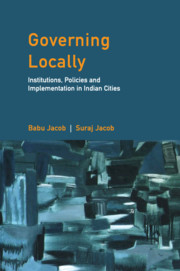6 - Participation in City Governments
Published online by Cambridge University Press: 06 August 2021
Summary
There is no gainsaying the importance of community participation in meaningful decentralisation. The notion of involving the public is natural and inherent to the concept of local governance. Chapter 2 argued that along with state–local relations, community participation is critical for ensuring effective and just local action and deepening democracy in governance. Where does ‘participation’ occur in decentralised governance? What shapes it? How is it linked to local government action and outcomes? These are the questions explored in this chapter.
The chapter begins by exploring the literature on public participation and contestation in governance. The next section turns to formal spaces of participation envisaged in decentralisation provisions in states and compares these with the lukewarm realities of participation. This is not to deny instances of strong participation; the section uses examples to suggest that these tend to be idiosyncratic rather than systemic. Based on the empirical findings, the final section discusses the conditions for sustained participation, focusing on the role of strong social intermediation as well as credible expectations that public participation can influence local government capacity and action.
Participation and Contestation: The Literature
The aspiration regarding ‘people's participation’ is that ‘broad involvement of a conscientized and mobilized citizenry would lead to a higher and sustainable popular engagement with public policy at a societal level’ (Blair 2020, 68), which is indeed an important animus for decentralisation in the first place. Participation has come to be regarded both as an important end in itself and as a means to other desirable outcomes. But structural factors such as economic class and local social hierarchies can overwhelm opportunities for participation. For central India, Sundar (2001) observes that ‘participatory committees’ meant for forest-dwelling communities are actually controlled by government staff and that such interventions end up extending government control.
Although it is difficult to identify the propitious conditions for genuine participation, nevertheless ‘participation’ is ubiquitous in articulations of governance and stands co-opted from multiple sides, unfortunately hollowing out its meaning. It has been adopted by international development funders and governments collaborating with them as well as by their ideological opponents. Similar is the case with ‘inclusion’, a term that is often used after diluting the centrality of power and inequality inherent to concepts of social and distributive justice (Coelho and Maringanti 2012; Bhattacharyya 2016).
- Type
- Chapter
- Information
- Governing LocallyInstitutions, Policies and Implementation in Indian Cities, pp. 168 - 184Publisher: Cambridge University PressPrint publication year: 2021



